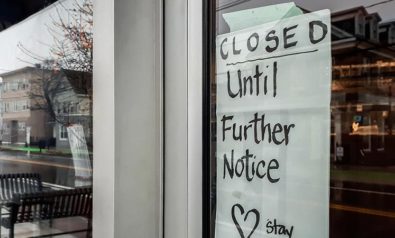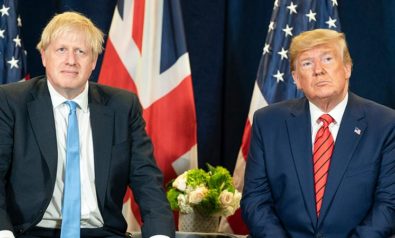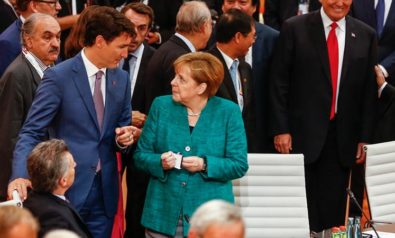America has been living on hubris and borrowed time, mired in an orgy of debt, delusion and dogma. Its stock traders have, for a decade now, chosen to believe that events which ordinarily would have resulted in losses are in fact causes for celebration in a marketplace that has defied logic and gravity. The optical illusion is in the process of ending.
Along the way, underlying totems of bullish faith have kept the party rolling. These include the assumption that the Federal Reserve will always do what it takes to alleviate profound market stress by cutting interest rates and, in the post-Great Recession years, providing monetary stimulus by means of quantitative easing, referred to as either the Greenspan, Bernanke, Yellen or Powell “put.”
Coronavirus Outbreak Puts the World’s Governments on Notice
In short, their actions have comprised the belief that the Fed will come to the rescue during times of extreme market stress. For stock traders, the trope has been: No need to worry, the Fed will always be there to take the buck, so load up on risk because there is a floor to any downside. More to the point, the Fed will keep the bull market in stocks on its perpetual and seemingly never-ending upward trajectory.
Fall From Grace
Nothing could interrupt the perpetual bull market, stock investors apparently believed, until a confluence of events — a global pandemic, an oil price war, a delusional president and idiocy run amok combined to smack Americans up-side the head with a two-by-four. As the world’s financial barometer, will even that be enough to inspire America’s market-making stock traders and algorithms to change their ways?
As the global stock markets now endure their inevitable fall from grace, irresponsible and amoral money managers continue to tell their clients to hold their portfolios in place and ride the roller coaster down, beating the drum to continue investing in stocks that have a long way to go before they hit bottom. Greed and hubris are alive and well as the investment industry proves, yet again, that it has learned nothing from the Great Recession or the series of other global financial catastrophes that took place in the 20th century.
The trajectory toward negative interest rates merely inspires the investment community to identify new ways to keep the plates spinning. For fast money traders, negative interest rates will be another sure-fire winner. They can make a lot on money in a negative interest rate environment thanks to the duration sensitivity of bond prices, as long as they treat bonds as a short-term upside play.
Meanwhile, the Trump administration has had three months’ notice to order tens of millions of test kits, educate the public and put mechanisms in place to address the inevitable spread of COVID-19 on America’s shores. Since the outbreak began in China in December last year, the Trump administration has mostly just sat on its hands in collective denial. This would be unforgivable in most other countries and would cause existing governments to collapse. In America, it merely serves to enhance the political divide.
It is often said that citizens get the leaders they deserve. In America, polling has proven multiple times that there is almost nothing the president can do that will prompt the average Trump supporter to abandon him at the ballot box. Whether selling America to the highest bidder or helping the country walk off a cliff, the only thing that appears to matter to at least half the country is whether the Republican Party can retain the White House and Senate. One has to wonder whether these voters have any comprehension of the state of play in America and how perilously close the US is coming to utter irrelevance on the global stage.
American Disaster Movie
As the coronavirus disaster movie plays out, America has a script that features a president who has a profound aversion to that which he cannot control. The preferred mechanism for Trump, when confronted with such a challenge, is to deny the underlying reality obvious to the crowd, labeling it fake news. But as the stretchers and body bags appear with greater frequency in the United States as the pandemic firmly takes hold, the inadequacy of the Trump administration’s response to the virus will appear to more and more Americans as a ludicrous, intelligence-insulting farce.
All the more so as his administration’s intransigence contrasts luridly with the hyper-efficient draconian response to COVID-19 seen in China, much of the rest of Asia and Italy. Trump’s embargo from the US of European travelers — with the bewildering exclusion of those from the United Kingdom, where the infection rate is gathering speed — smacks of grandiose back-of-an-envelope improvisation.
Meanwhile, the stench of a dying, deluded administration beckons alongside the moment of truth, one which will also see the death of America’s bull market and the arrival of a long-anticipated recession, which may well surpass the one prompted over a decade ago by the Great Recession in intensity, duration and attendant profound global hardship. In the face of what promises to be something worse this time, a scenario which waits stage left to enter as another Great Depression, the stewardship of America has never been so nakedly and egregiously deficient.
The views expressed in this article are the author’s own and do not necessarily reflect Fair Observer’s editorial policy.
Support Fair Observer
We rely on your support for our independence, diversity and quality.
For more than 10 years, Fair Observer has been free, fair and independent. No billionaire owns us, no advertisers control us. We are a reader-supported nonprofit. Unlike many other publications, we keep our content free for readers regardless of where they live or whether they can afford to pay. We have no paywalls and no ads.
In the post-truth era of fake news, echo chambers and filter bubbles, we publish a plurality of perspectives from around the world. Anyone can publish with us, but everyone goes through a rigorous editorial process. So, you get fact-checked, well-reasoned content instead of noise.
We publish 2,500+ voices from 90+ countries. We also conduct education and training programs
on subjects ranging from digital media and journalism to writing and critical thinking. This
doesn’t come cheap. Servers, editors, trainers and web developers cost
money.
Please consider supporting us on a regular basis as a recurring donor or a
sustaining member.
Will you support FO’s journalism?
We rely on your support for our independence, diversity and quality.
































